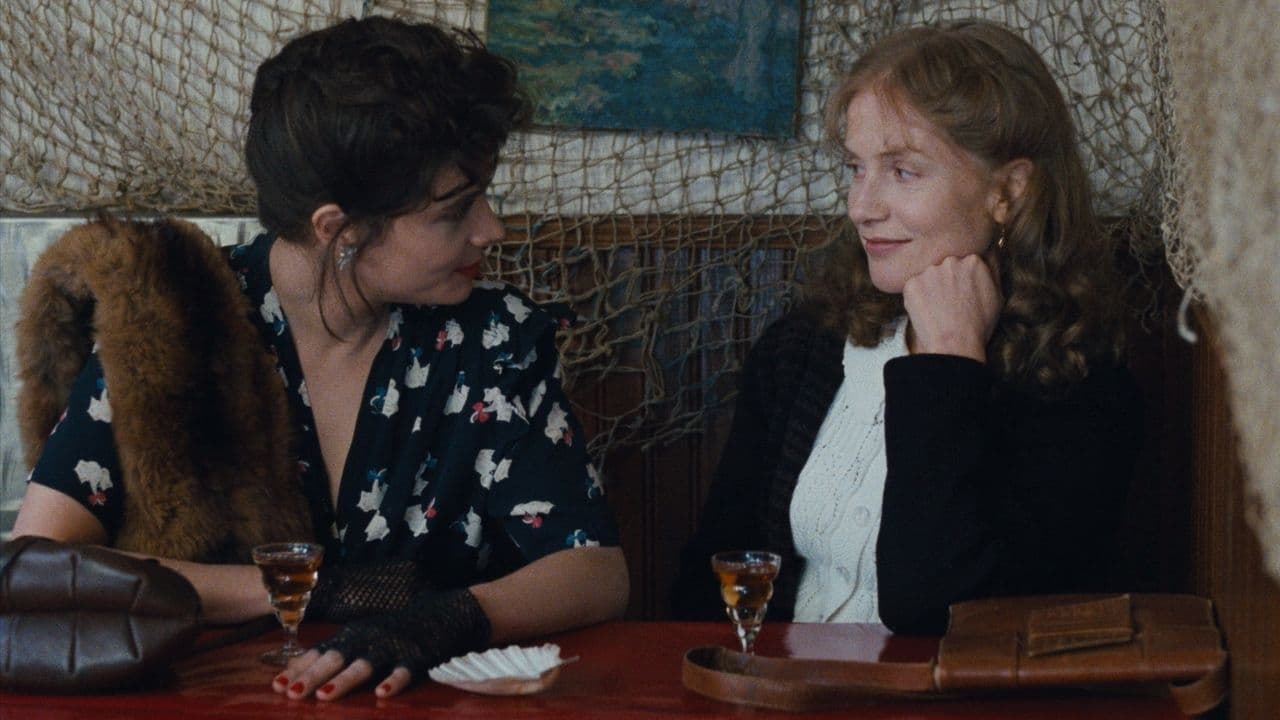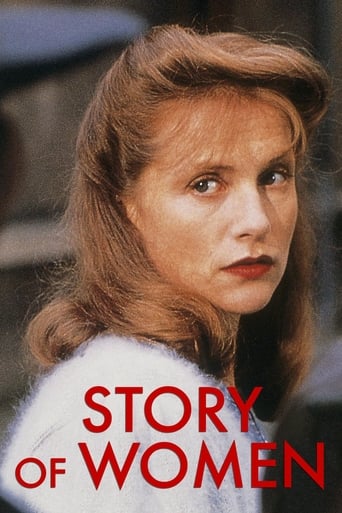



one of my absolute favorites!
everything you have heard about this movie is true.
View MoreThe first must-see film of the year.
This movie feels like it was made purely to piss off people who want good shows
View MoreMarie Latour, a woman of limited schooling, raises two children in a ratty flat during World War II in occupied France. In 1941, her husband Paul returns from German captivity, too weak to hold a job. Marie discovers she can make money performing abortions, using a soapy water douche. Many of her clients are knocked up by occupying Germans.The film is based on the true story of Marie-Louise Giraud, guillotined on July 30, 1943, for having performed 27 abortions in the Cherbourg area, and oddly enough has been embraced by John Waters. Waters is typically known more for endorsing "Christmas Evil" than French cinema, but this just goes to show how diverse his love is.I find it quite interesting that the French women are getting pregnant by German soldiers. While this is a frequent consequence of war (though hopefully diminishing), and virtually created modern Sicily, it is a rare thing to see it show up in a film. For that, I applaud them.
View MoreFrom director Claude Chabrol (Le Boucher), from the title it was no obvious what the story or plot of this French film would involve, but I was introduced to it because of the book 1001 Movies You Must See Before You Die, and if it featured in it that was good enough reason for me it a chance. Basically set in World War II, France is occupied by the Nazis, Marie Latour (Isabelle Huppert) is a mother with two children she raises in a decayed flat, she has limited education from her schooling, and her husband Paul (François Cluzet) who was on the front has returned home. Paul's weakness is causing him problems holding a job, so it is up to Marie to make money somehow to support the family, and she discovers a way to use soapy water douche as a way to abort unwanted babies of women, and she charges them for this service. Many of the women she performs abortions for have been impregnated by Germans occupying the country, and with the money she makes she can afford a new flat with more bedrooms, she also rents the bedrooms to prostitutes to take their clients during the day, and she can buy better food and new clothes. Eventually this good fortune turns sour when Paul becomes dismissive towards Marie because he knows what she has been doing for prostitutes and pregnant women, but she is keen to find another career in singing, but of course the authorities catch onto what she is up to, so she is arrested, and becomes one of the last women in France to be guillotined. Also starring Marie Trintignant as Lulu / Lucie and Nils Tavernier as Lucien. I did not realise it was based on a true story, but it makes sense when I think about it, because the harshness of the plot is realistic, and the way that it is played out is well done, the performance of Huppert is suitable for the character as well, it can be uncomfortable in moments, but it is an intriguing Second World War drama. It was nominated the Golden Globe for Best Foreign Language Film. Worth watching!
View MoreIsabelle Huppert portrays an uneducated but self-reliant wartime mother of two, who almost ruthlessly assumes the traditional male role of family breadwinner by helping (to use an old euphemism) young girls 'in trouble'. The film isn't exactly impartial in its attitude toward the opposite sex, but don't me misled by the somewhat presumptuous title: it isn't strictly a story for women, and despite the vocation of its heroine has little to say about the volatile issue of abortion. The focus is more on the plight of women as second-class citizens, forced by necessity to fend for themselves (and rely on each other) while their men are away playing soldiers. It tells a complex story very simply, avoiding any soapbox grandstanding but allowing Huppert a chance to invest her character with plenty of gender-specific spleen. The final impact is undeniable: it's an often powerful experience, likely to stir up plenty of talk and emotion.
View MoreThough I had owned this on VHS (recorded off French TV), I only opted to check it out now – after acquiring the film in a version accompanied by English subtitles, on the occasion of its director's birthday. While not a typical effort (being a period melodrama and based on fact to boot), in retrospect, it is justly considered among Chabrol's finest.Star Isabelle Huppert (in one of her best performances, playing an essentially unsympathetic if pitiable type) received the Best Actress award at the Venice Film Festival for her work here. Interestingly, I would 'meet' Chabrol there in 2004 where the winning film that year happened to deal with the exact same subject as STORY OF WOMEN – the controversy regarding the practice of abortion, i.e. Mike Leigh's VERA DRAKE! Co-star Francois Cluzet, who acts pretty much as second-fiddle to Huppert in this case, would eventually come into his own under Chabrol's guidance in the similarly excellent L'ENFER (1994). The film, however, also provides a notable showcase for Marie Trintignant in the role of Huppert's prostitute friend; again, the actress would subsequently be promoted to lead status for the same director's BETTY (1992), which I have just watched and reviewed.STORY OF WOMEN, then, makes for compelling viewing in several different keys: as a character study (Huppert wants to be a singer, refuses to sleep with her ex-P.O.W. husband but then takes a much younger lover, of course offers her services to girls 'in trouble' and ultimately renounces her faith while in prison), as a look at war-torn France (though the Nazis are hardly ever in the foreground, the hardships endured by the locals obviously have a lot to do with how they are 'forced' to behave) and as a critique, in the vein of Costa-Gavras' movies, of the justice system (there is no doubt Huppert was at fault but the punishment meted out, to set an example and uphold the country's moral rectitude to counter the dishonor of occupation, was too extreme). Oddly enough, once the husband exposes her to the authorities for rather selfish reasons to begin with, he basically exits the picture and is never shown feeling any kind of remorse.For the record, Chabrol had already treated a cause célèbre in VIOLETTE NOZIERE (1978; which I will get to soon in my ongoing marathon, since I am actually approaching it in reverse chronological order!) and would do so again in the recent A GIRL CUT IN TWO (2007; that I have already viewed and commented upon).
View More